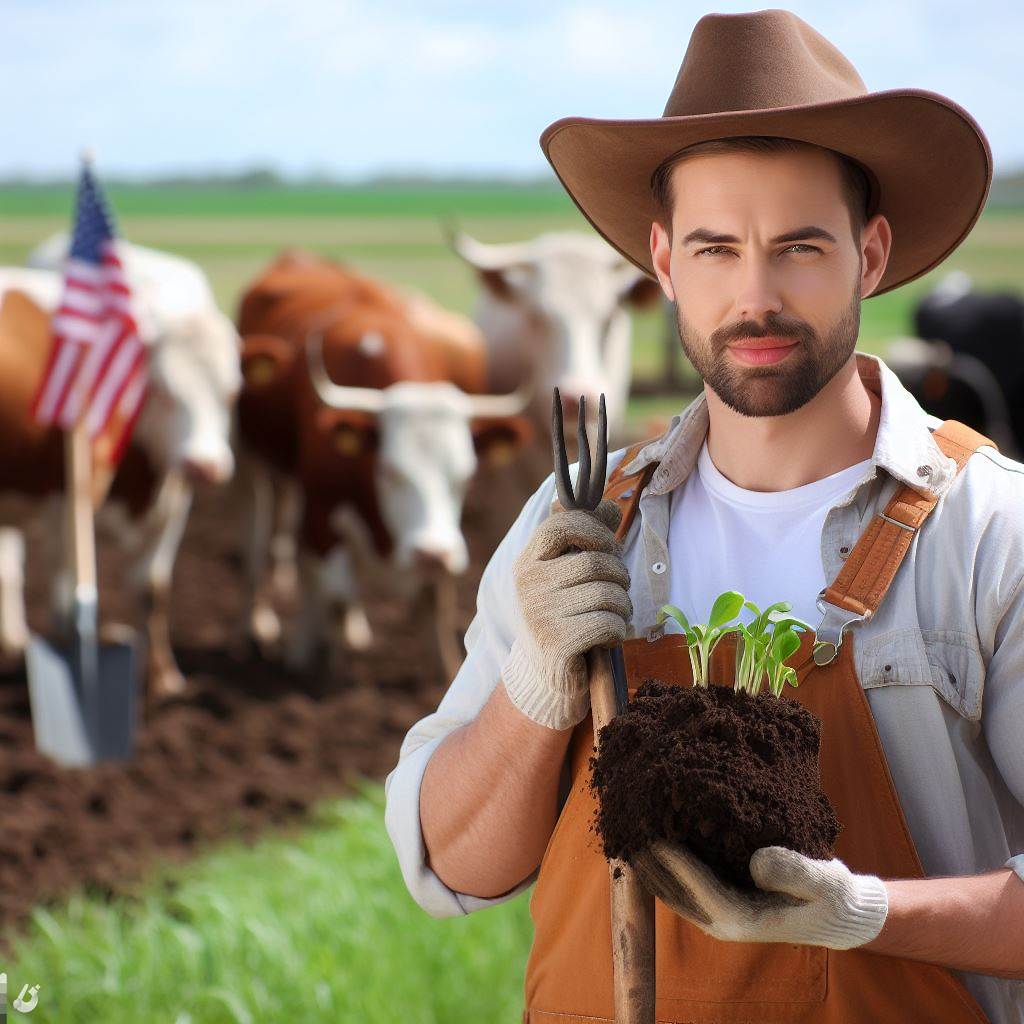Introduction
Dairy farming is an industry of immense importance, providing us with essential dairy products like milk, cheese, and yogurt.
The life of a dairy farmer is not only demanding but also rewarding.
Agriculture has always been a vital part of human civilization, and dairy farming plays a significant role in ensuring a steady supply of dairy products.
The industry supports not only the farmers who earn their livelihoods from it but also the economy.
The life of a dairy farmer is characterized by hard work, dedication, and round-the-clock commitment.
From dawn to dusk, their work revolves around the care and management of cows, ensuring their health and well-being.
A dairy farmer’s day begins well before the sun rises. The first task is to milk the cows, a process that requires skill and precision.
Cows need to be fed a balanced diet to ensure optimal milk production.
The farmer meticulously tends to the needs of each cow, monitoring their health, and providing necessary medical care.
Regular check-ups and vaccinations are part of their routine. Maintaining a clean and hygienic environment in the cowshed is crucial for animal welfare and milk quality.
Additionally, dairy farmers must also manage the business aspects of their farms, including marketing and selling their products.
They need to stay updated on industry trends, technological advancements, and government policies related to dairy farming.
While the life of a dairy farmer is physically demanding and requires great attention to detail, it is also a rewarding profession.
The satisfaction of providing nutritious dairy products to people’s tables and maintaining a sustainable business makes it all worthwhile.
In short, the dairy farming industry is of utmost importance, and the life of a dairy farmer is filled with challenges and rewards.
Transform Your Agribusiness
Unlock your farm's potential with expert advice tailored to your needs. Get actionable steps that drive real results.
Get StartedTheir dedication and hard work ensure a steady supply of dairy products that we all rely on.
Morning tasks
Each morning, a dairy farmer begins the day before dawn, as early rising is necessary to accomplish all the tasks.
The first step is to wake up early and be prepared for the responsibilities that await.
Engaging in morning tasks helps create a structured routine that ensures the smooth functioning of the dairy farm.
Waking up before dawn
Waking up before dawn is not easy, but it is essential for a dairy farmer.
Rising early allows them to have enough time to complete all the necessary tasks required to manage the farm successfully.
It also provides an opportunity to enjoy the peacefulness and serenity of the early morning hours.
Preparing for the day
Once awake, the dairy farmer starts preparing for the day ahead.
A crucial aspect of this preparation is checking the weather conditions.
By understanding the weather forecast, a farmer can make informed decisions about outdoor tasks and prepare for any potential challenges that may arise due to adverse weather.
This step ensures the smooth execution of daily farm activities.
Reviewing the schedule and tasks is another important aspect of preparing for the day.
A dairy farmer needs to have a clear understanding of the tasks that need to be accomplished to efficiently manage the farm.
By reviewing the schedule, they can prioritize tasks and allocate time appropriately, ensuring all necessary jobs are completed.
Milking the cows
Milking the cows is a daily responsibility that requires proper execution.
Before beginning the milking process, the dairy farmer prepares the milking parlor.
This involves cleaning and sanitizing the area to maintain a hygienic environment.
It is crucial to create a clean and safe space that promotes milk quality and cow health.
During the milking process, the dairy farmer utilizes milking machines to extract milk from the cows.
This process should be carried out carefully and following the correct procedures to prevent any harm to the animals or quality issues with the milk.
It is vital to maintain efficiency and accuracy while milking to maximize productivity.
In addition to milking, ensuring cow comfort and health is of utmost importance.
The dairy farmer takes various measures to provide the cows with a comfortable environment.
This includes providing proper bedding, ensuring access to food and water, and monitoring the cows for any signs of illness or distress.
Showcase Your Farming Business
Publish your professional farming services profile on our blog for a one-time fee of $200 and reach a dedicated audience of farmers and agribusiness owners.
Publish Your ProfileThe farmer’s attention to cow well-being helps maintain their health and, consequently, milk production.
Morning tasks are an integral part of a dairy farmer’s daily routine.
By waking up before dawn and adhering to a structured plan, farmers can ensure the smooth functioning of their dairy farms.
Morning preparations, including checking the weather, reviewing schedules, and milking the cows, contribute to the overall success of the farm and the well-being of the animals.
Read: Farming Subsidies in Japan: 2024 Update
Daytime responsibilities
During the daylight hours, a dairy farmer must fulfill several important responsibilities to ensure the well-being and productivity of their herd.
Feeding and nutrition management
One crucial aspect of a dairy farmer’s daytime tasks is implementing a balanced diet for their cows.
Cows require specific nutrients to maintain good health and produce high-quality milk.
Therefore, the farmer must carefully formulate a diet plan that meets these nutritional requirements.
Furthermore, monitoring feed quality and availability is essential.
The dairy farmer must regularly assess the quality of the feed they provide to their cows, ensuring it is free from contamination or spoilage.
Additionally, they need to ensure a steady supply of feed to meet the cows’ demands throughout the day.
Herd health management
Proper herd health management is another important responsibility during the daytime.
Regular veterinary check-ups are necessary to monitor the overall health of the cows.
These check-ups help identify and address any potential health issues before they escalate.
In addition to check-ups, vaccinations and preventive care are crucial.
The dairy farmer must ensure that all cows receive timely vaccinations to protect them from common illnesses and diseases prevalent in their environment.
This helps prevent outbreaks and ensures the long-term health of the entire herd.
Moreover, the farmer must be prepared to handle any medical issues or emergencies.
They need to promptly address any health concerns that arise, providing necessary treatments or contacting a veterinarian when necessary.
Quick and effective action is vital to prevent the spread of diseases and minimize the impact on the herd’s productivity.
Reproduction and breeding
Monitoring heat cycles is an essential aspect of reproductive management on a dairy farm.
The farmer needs to closely observe the behavior and physical signs of the cows to identify when they are in heat.
This helps determine the optimal time for breeding and increases the chances of successful pregnancies.
Artificial insemination is a commonly practiced method to ensure selective breeding and genetic improvement in dairy cows.
The farmer needs to have the knowledge and skills to perform artificial insemination accurately, following proper protocols and using high-quality semen from desired bulls.
Additionally, regular pregnancy checks are necessary to confirm if the cows have conceived.
This information allows the farmer to make appropriate management decisions, such as adjusting nutrition or monitoring the progress of individual cows.
Early identification of non-pregnant cows enables efficient re-breeding processes to maintain a productive and efficient herd.
In essence, the daytime responsibilities of a dairy farmer involve various tasks related to feeding and nutrition management, herd health, and reproduction.
By diligently fulfilling these responsibilities, the farmer ensures the well-being, productivity, and genetic advancement of their herd.
Read: Agri-Insurance: Policy Changes in 2024

Afternoon tasks
Fieldwork and crop management
After a productive morning at the dairy farm, the afternoon brings with it a new set of tasks and responsibilities.
It’s a crucial time for fieldwork and crop management, ensuring a steady supply of nutritious feed for the cows.
One of the primary tasks in the afternoon is planting and harvesting crops specifically grown for cow feed.
These crops play a vital role in providing the necessary nutrients to keep the cows healthy and productive.
With attention to crop rotation and proper timing, the farmer ensures a continuous supply throughout the year.
In addition to planting and harvesting, the dairy farmer also focuses on soil management and fertilization.
Regular soil testing allows them to assess nutrient levels and make informed decisions about the type and amount of fertilizer required.
It’s important to strike the right balance to ensure optimal crop growth and maximize nutrient absorption.
Showcase Your Farming Business
Publish your professional farming services profile on our blog for a one-time fee of $200 and reach a dedicated audience of farmers and agribusiness owners.
Publish Your ProfileProper irrigation is essential for maintaining healthy crops, and the farmer takes care of operating and maintaining the irrigation systems.
They ensure the right amount of water is provided to the fields, avoiding both over- and under-irrigation.
By monitoring soil moisture levels and adjusting irrigation schedules, the farmer promotes water conservation and efficient crop growth.
Equipment maintenance and repair
Another essential aspect of the afternoon tasks revolves around equipment maintenance and repair.
The farmer recognizes the significance of well-maintained machinery for smooth farm operations.
Regular upkeep of tractors, milking machines, and other tools ensures their longevity and reduces the likelihood of breakdowns during critical farming activities.
Administration and record-keeping
Apart from practical tasks, administration and record-keeping are also integral parts of managing a dairy farm.
Financial management entails keeping track of expenses, revenue, and budgeting to ensure a profitable operation.
The farmer maintains meticulous records to monitor cash flow, identify cost-saving opportunities, and make informed financial decisions.
Inventory management is crucial to avoid shortages and wastage.
The farmer tracks supplies, such as animal feed, medicines, and equipment, ensuring they are stocked up and readily available when needed.
Regular inventories and evaluation of usage patterns help maintain efficient resource management.
Compliance with regulations and certifications is an essential responsibility of a dairy farmer.
They must adhere to local, state, and federal guidelines related to food safety, environmental impact, and animal welfare.
The farmer continuously ensures they meet all necessary standards and renew certifications to uphold their reputation and maintain consumer trust.
With these afternoon tasks at hand, the dairy farmer meticulously manages their time, balancing fieldwork, equipment maintenance, and administrative duties.
Their dedication and attention to detail contribute to the sustainable and successful operation of the dairy farm.
Read: Biofuel Policies: Effects on Crop Choices
Evening responsibilities
Evening milking
Preparations for evening milking
In the evening, I begin by preparing the cows for milking, ensuring they are comfortable and relaxed.
Milking routines and procedures
Next, I carefully follow our established milking routine, which includes sanitizing the teats and attaching the milking machines.
Cleaning and sanitizing
Milking equipment cleaning
After each milking session, I diligently clean and sanitize all the milking equipment to maintain hygiene and prevent contamination.
Maintaining sanitary conditions in the dairy
I also make sure to keep the entire dairy clean and sanitary, regularly disinfecting the floors, walls, and surfaces to prevent the spread of bacteria.
Planning for the next day
Reviewing tasks and schedules
Towards the end of the evening, I review the tasks I accomplished during the day and go through the schedule for the next day.
Making adjustments if necessary
Based on any unexpected circumstances or changes, I make necessary adjustments to the tasks and schedule to ensure smooth operations on the farm.
Read: Hops and Dreams: The Craft Beer Farmer
Challenges and Rewards
Physical and Mental Demands
Dairy farming requires immense physical and mental strength to handle the day-to-day tasks.
Milking cows, cleaning barns, and lifting heavy equipment are physically demanding activities.
Additionally, managing and supervising farm operations can be mentally exhausting.
The constant workload and long hours exert a toll on the farmer’s body and mind.
Nevertheless, the satisfaction of a well-run farm and contented animals make it all worthwhile.
Weather-related Challenges
Weather plays a significant role in a dairy farmer’s life and presents numerous challenges.
Extreme temperatures, such as scorching heatwaves or harsh winter freezes, affect livestock and crops.
Storms and torrential downpours can disrupt feeding schedules and damage buildings and equipment.
Adapting to unpredictable weather patterns requires careful planning and flexibility.
Despite these challenges, experienced farmers know how to manage and adapt to ever-changing weather conditions.
Experiencing the Joys of Dairy Farming
Amidst the challenges, dairy farming offers an array of rewarding experiences that bring joy to farmers.
Bottle-Feeding Calves
One of the most heartwarming experiences on a dairy farm is bottle-feeding newborn calves.
The bond formed during this process becomes an enduring connection between the farmer and the animals.
Watching the calves grow, thrive, and become part of the herd is immensely fulfilling.
Building Strong Relationships with the Animals
Dairy farmers spend countless hours caring for and tending to their cows, cultivating strong relationships.
Showcase Your Farming Business
Publish your professional farming services profile on our blog for a one-time fee of $200 and reach a dedicated audience of farmers and agribusiness owners.
Publish Your ProfileEach cow has a distinct personality, and farmers take pride in knowing and understanding each one individually.
The mutual trust and respect built between the farmer and the animals create a unique bond.
This bond not only ensures the well-being of the cows but also enhances their productivity.
Pride in Producing High-Quality Dairy Products
Dairy farmers take immense pride in producing high-quality dairy products for consumers.
Through careful breeding, nutrition, and meticulous care, they work towards achieving superior milk production.
Seeing their products on store shelves and knowing they contribute to people’s nutrition is incredibly fulfilling.
The pride in producing nourishing dairy products drives dairy farmers to overcome challenges and strive for excellence.
In brief, despite the physical and mental demands and weather-related challenges, the joys of dairy farming make it a rewarding venture.
Bottle-feeding calves, building strong relationships with animals, and producing high-quality dairy products create a sense of accomplishment and fulfillment.
Dairy farmers embrace these challenges and rewards, dedicating their lives to the well-being of their cows and the satisfaction of providing consumers with nutritious dairy products.
Conclusion
A typical day in the life of a dairy farmer starts at the crack of dawn and continues until dusk.
From milking cows to tending to their needs, it is an arduous yet rewarding occupation.
We appreciate the commitment and hard work of dairy farmers who ensure that we have fresh and nutritious milk and dairy products on our tables every day.
As consumers, we can support local dairy farms by choosing their products over imported ones.
By doing so, we are not only encouraging local agriculture but also contributing to the sustainability of our community.
So let’s show appreciation for the dedication of dairy farmers and make a conscious effort to support our local dairy farms and the invaluable products they provide.




